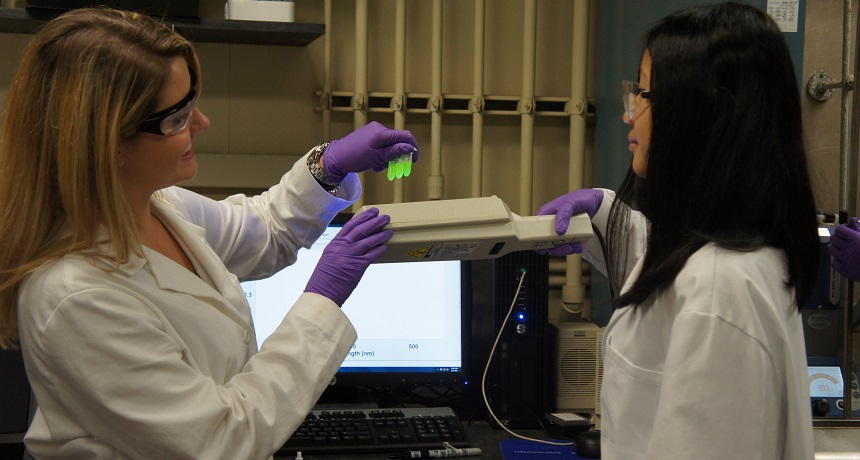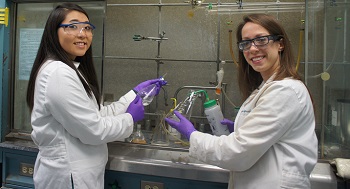Students in lab learn not to fear failure
Failure may seem like a dirty word, but it is critical to success in science

Agnieszka Gil (left) mentored high school student Annabelle Ng (right) in research. Annabelle says the experience makes her want to keep coming back for more.
P. Tonge
When students read a journal article or news account about some scientific discovery, they learn what worked. Scientists present the methods that got the best result. They often show only the results that are significant and important. So scientific papers portray success. What they won’t show are the mistakes or failures that came first. Yet sometimes those mistakes pointed the way to success, teens are now learning.
It can take a long time and many experiments to achieve scientific success. Robbin Jang, 16, and Annabelle Ng, 15, learned that while working this summer in a biochemistry lab at Stony Brook University in New York. What’s more, these students from Great Neck South High School in New York learned that failure is not necessarily something to fear.
“I like the idea of scientific research,” says Robbin. It’s the foundation for “every lesson you learn in school and understanding everything you see in life.” So the teen was excited when her teacher, James Truglio, took her to Stony Brook for her first lab experience last year. She returned this summer, before her final year of high school, to work with Lauren Spagnuolo. She’s a graduate student in her fifth year of studying chemistry.
This summer, Robbin has been working with Lauren, who is making new drugs to fight harmful bacteria. Lauren tries to build molecules that stop the germs from building the long, fatty chains that make up their cell membranes. If bacteria can’t make more membrane, they can’t split in two to reproduce.

Robbin enjoyed learning about chemistry and reading scientific papers. She also liked making novel chemicals and testing to see if they work. But many times, the new chemicals she helped seemed to be duds. At first, this made the teen anxious. She worried that she might be making costly mistakes. But Lauren reassured her that finding out what doesn’t work is “just part of the learning process.” With time, the teen got comfortable with the idea that every experiment wouldn’t succeed. “Others would probably grow aggravated and impatient after my umpteenth time doing a reaction incorrectly,” Robbin says. But not Lauren. She “always laughs it off and tells me how I can save my experiment.”
Annabelle, soon to be a high school junior, also learned a lot about failure and success. She worked with graduate student Agnieszka Gil. Together, they have been studying molecules that change shape in response to light. One example: the protein in your eye that responds to light and allows you to see.
“Sometimes I try something and it takes a while for the experiment to run.” This means that finding out whether Annabelle did something wrong can be a stressful waiting game, because “if you did something wrong you need to do it again.” But she’s now learning to be patient and not to expect instant success. This trial and error is part of what science is all about.
The teen is very thankful to have had this opportunity to work in a university lab doing important research. Few students get such an opportunity, she notes.
Her mentor, Agnieszka, agrees. “I didn’t have experiences like this in high school,” she recalls. An experience like this “really gives the students a jump start in their careers.” You only need to start chatting to see “they are really learning,” she says.
As the high school students make mistakes, they learn and become more capable. The knowledge and tools they are picking up also give them a taste of what it’s like to be an independent scientist, says Lauren. Mistakes and failure are part of the job. And in science, figuring out why something failed is what may just put them on the road to success.
Follow Eureka! Lab on Twitter
Power Words
bacterium (plural bacteria) A single-celled organism forming one of the three domains of life. These dwell nearly everywhere on Earth, from the bottom of the sea to inside animals.
biochemist A scientist who studies the chemical processes and chemical transformations that take place inside organisms.
cell membrane Separates the inside of a cell from the outside of it. Some particles are permitted to pass through the membrane.
graduate student Someone working toward an advanced degree by taking classes and performing research. This work is done after the student has already graduated from college (usually with a four-year degree).
molecule An electrically neutral group of atoms that represents the smallest possible amount of a chemical compound. Molecules can be made of single types of atoms or of different types. For example, the oxygen in the air is made of two oxygen atoms (O2), but water is made of two hydrogen atoms and one oxygen atom (H2O).
proteins Compounds made from one or more long chains of amino acids. Proteins are an essential part of all living organisms. They form the basis of living cells, muscle and tissues; they also do the work inside of cells. The hemoglobin in blood and the antibodies that attempt to fight infections are among the better known, stand-alone proteins. Medicines frequently work by latching onto proteins.
synthesis The production of a substance by the combining of simpler chemical building blocks.